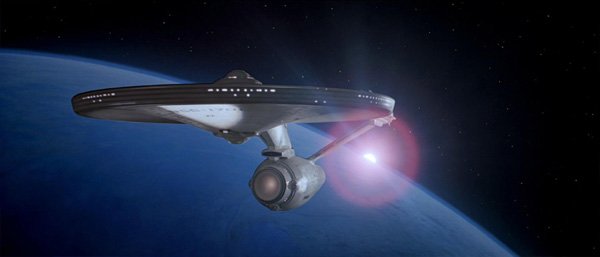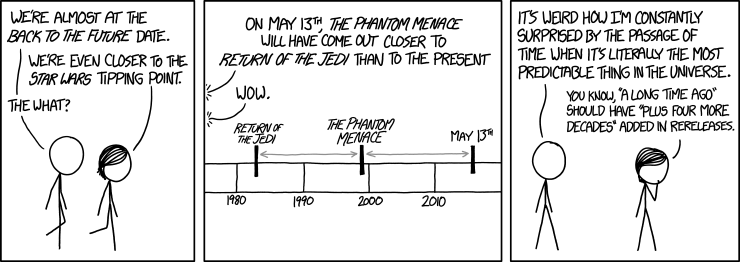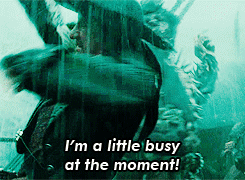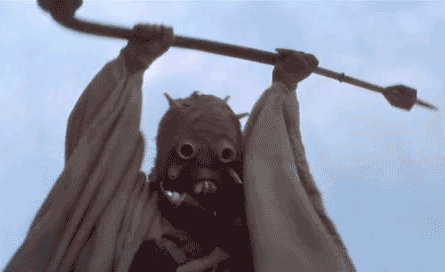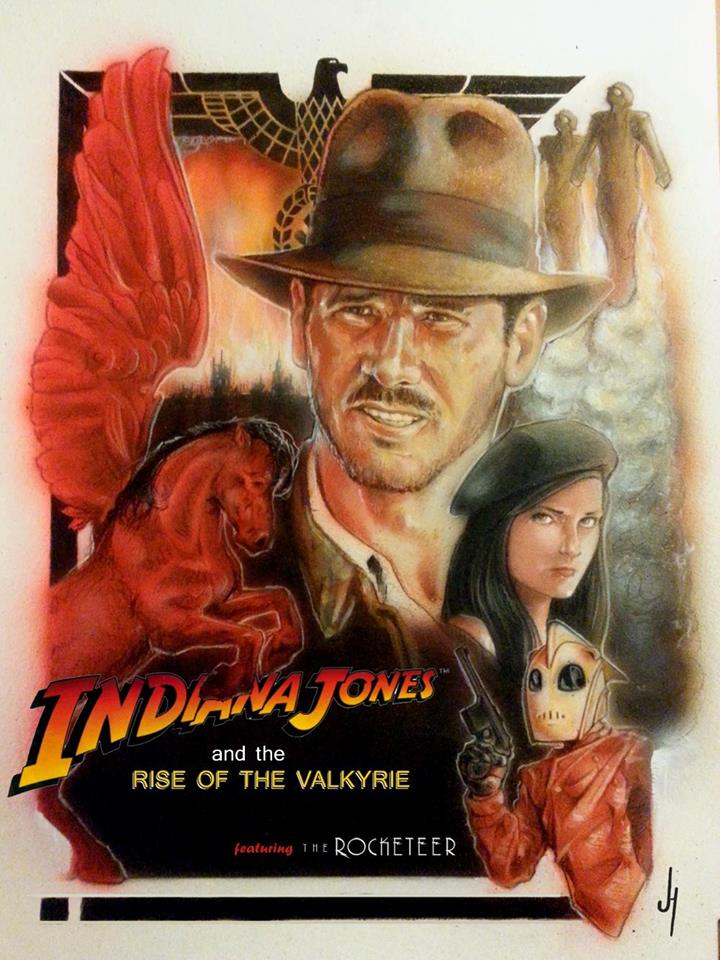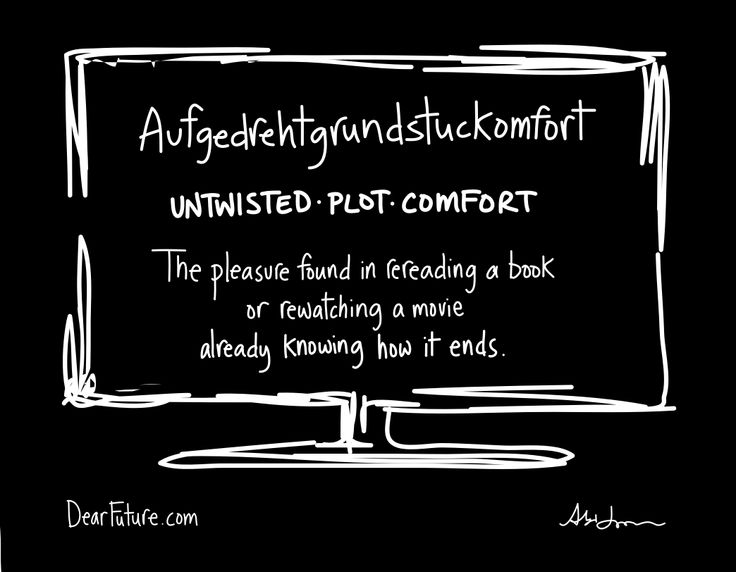A few weeks ago, I was feeling pretty low. The headlines about Ferguson and Eric Garner and the torture report, all coming so close to each other, followed by the inevitable scrimmage in social media and blog comments — which served as yet another solemn reminder that there are at least two Americas and they don’t quite exist on the same planet — left me utterly heartsick. Beaten down, demoralized, and wondering if a lot of my fundamental beliefs about this country and people in general were completely off-base.
And so it was I found myself standing one afternoon in front of the creaking, overloaded, not-dusted-often-enough shelves that comprise the Bennion Library, trying to decide what to read next. It wasn’t just a question of what I was in the mood for, or what I haven’t read yet. This was one of those cases where I needed to read… something… something that might restore some of my faith in humanity, or at least quell my growing conviction that the whole damn bunch of us deserve whatever’s coming so the cockroaches can have their turn on top of the evolutionary ladder. A mystery or an action-adventure novel wasn’t going to cut it; all too often, those genres are predicated on exactly the sort of inhumanity-to-man I’d had enough of. Similarly, I wasn’t very enthused about any of my sci-fi or Stephen King or Anne Rice books. While they don’t exactly ignore the human condition, they weren’t likely to say the sort of things I was craving to hear. Finally, my gaze fell upon a tattered paperback copy of Harper Lee’s To Kill a Mockingbird.
I’m not even sure how that one ended up in my collection, to be honest. I read it back in high school, like most people of a certain age, I imagine. (Is this one still assigned to kids, or has it been banished from the curriculum for some ridiculous PC reason?) I remember experiencing it back then as something I had to endure rather than enjoyed. Like getting a vaccination or eating something that’s good for you. Beyond that, though, the book was just a blur. I couldn’t recall anything about the story or the characters, except a couple names and a scene in a courtroom… details I could have gotten from a blurb in a magazine about the movie version. And yet… at some point, for some reason, I picked up a copy of it… probably for a quarter at a thrift store or a library sale, and likely with intentions of revisiting it someday from an adult’s perspective. But I never got around to actually doing that. The book just ended up on a stack of other literary fiction works that I bought with good intentions but have largely ignored. But now, as my eyes followed the white stress-lines running the length of the book’s spine and took in the lettering of the title, smudged and faded by the sweat of someone else’s hand, some trace memory stirred deep in my mind. Like a vague sensory impression of the perfume your mother wore when you were a child, an elusive feeling more than anything you can really name. And I knew this was the book I needed to read just then.
I like to think I haven’t changed all that much since I was a teenager, that I’m still in touch with the sixteen-year-old boy I used to be, but the truth is… my teenaged self was a dumbass for failing to appreciate this book, because To Kill a Mockingbird is magnificent. First of all, it’s a wonderful evocation of a very specific time and place, namely small-town Alabama in the 1930s. (It occurs to me that part of the problem I had with it back in high school might have been the setting, of which I would have been relatively ignorant then. I know a lot more about the Depression now, and can much better imagine Model As rolling up and down dusty streets, and careworn farmers in overalls and the more well-to-do men in their white shirts and hats.) It’s a charming coming-of-age story — and I’m on record as being a real sucker for those — that realistically captures the essence of the pre-teen protagonist while also conveying a lot of adult truths. It’s unexpectedly funny in places, and the overall tone is warm and humane and just plain decent, which is what I needed. And all this is achieved with plain, unflowery language that simply tells the story. It really is a masterful achievement, and I understand now why so many people name it as their favorite novel.
But it’s the book’s core of decent humanity that really charmed, that soothed my battered soul just when I needed it most. That’s what I was remembering the afternoon I noticed it sitting in my stacks, and that’s what will stay with me after the details fade again (which I know they will; I fear my retention isn’t as good as it used to be, damned middle age!)
I think many people will remember the exchange between Scout, our protagonist, and her father Atticus that comes on the very last page:
“… Atticus, he was real nice… ”
His hands were under my chin, pulling up the cover, tucking it around me.
“Most people are, Scout, when you finally see them.”
But I was more deeply moved by a passage from a few pages earlier, when Scout has just met the mysterious Boo Radley whose presence has hovered like a shadow over the entire story:
Boo and I walked up the steps to the porch. His fingers found the front doorknob. He gently released my hand, opened the door, went inside, and shut the door behind him. I never saw him again.
Neighbors bring food with death and flowers with sickness and little things in between. Boo was our neighbor. He gave us two soap dolls, a broken watch and chain, a pair of good-luck pennies, and our lives. But neighbors give in return. We never put back into the tree what we took out of it: we had given him nothing, and it made me sad.
“I never saw him again… we had given him nothing, and it made me sad.” Something about that delineates so much of the human experience for me. It’s only after the fact, it seems, that we realize how we failed to be as good as we ought to have been. As good as we wish we were.
I think someday that’s the sentiment that’s going to be applied to this moment of history by the people who are living through it right now. Reading To Kill a Mockingbird did cheer me up… but it also highlighted for me how we’re failing, we Americans, we humans, to be as good to each other, to our neighbors, to the whole damn planet, as we ought to be. And it does make me sad.
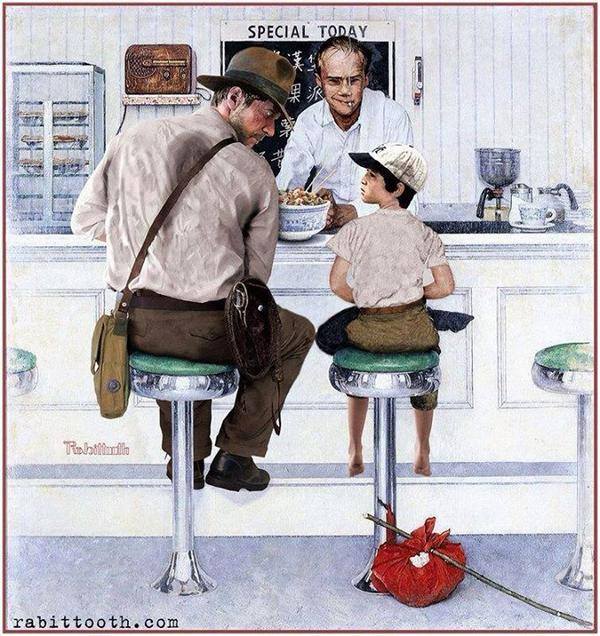 The Chinese characters on the menu in the background and the vaguely non-Western features of the waiter suggest this is supposed to be somewhere in the Orient, possibly the moment when Dr. Jones and Short Round first encounter each other in Shanghai (“He tried to pick my pocket”), or maybe just afterward when Indy is trying to figure out what to do with the boy. But that’s not what I thought at first glance.
The Chinese characters on the menu in the background and the vaguely non-Western features of the waiter suggest this is supposed to be somewhere in the Orient, possibly the moment when Dr. Jones and Short Round first encounter each other in Shanghai (“He tried to pick my pocket”), or maybe just afterward when Indy is trying to figure out what to do with the boy. But that’s not what I thought at first glance.

